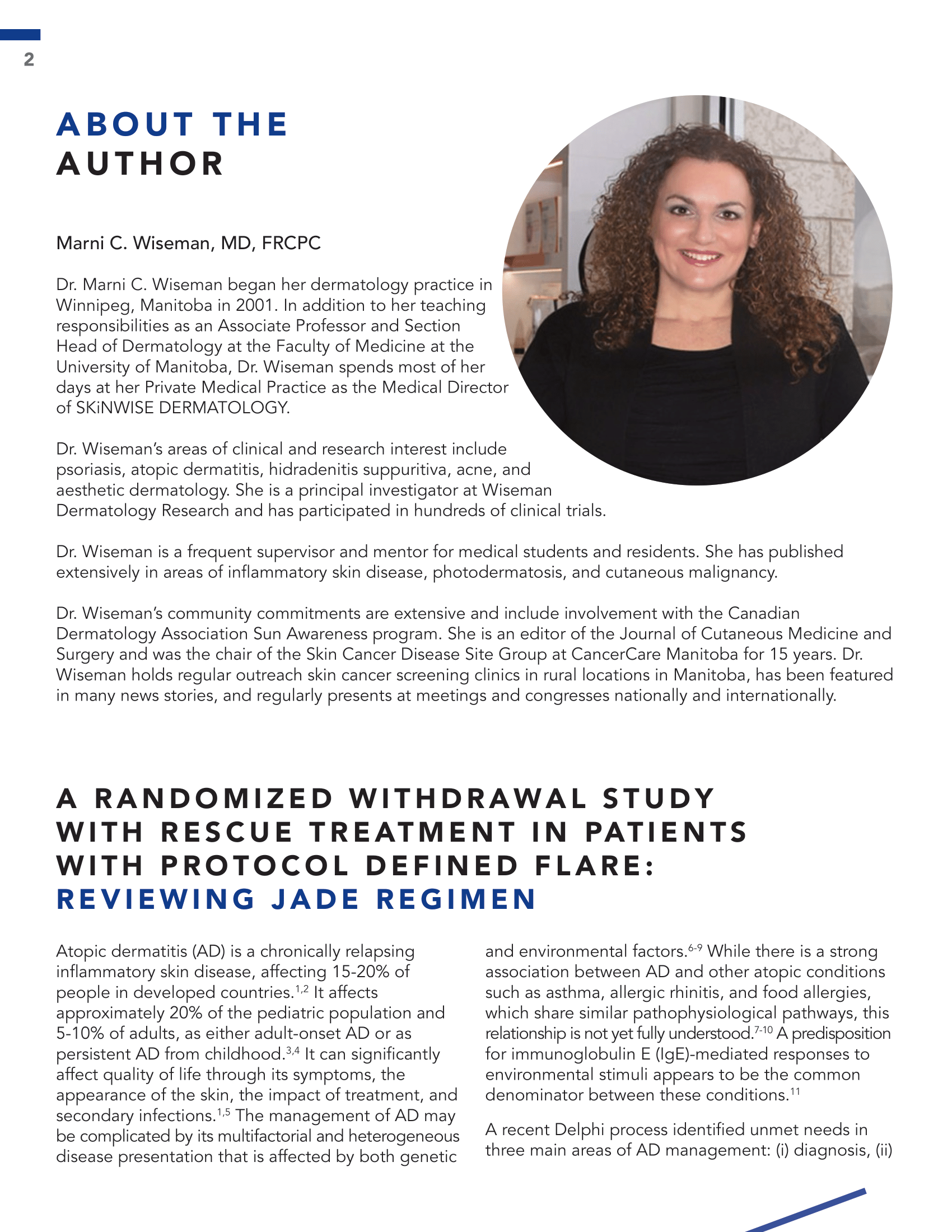A randomized withdrawal study with rescue treatment in patients with protocol defined flare: reviewing jade regimen
Abstract
Atopic dermatitis (AD) is a chronically relapsing inflammatory skin disease, affecting 15-20% of people in developed countries. It affects approximately 20% of the pediatric population and 5-10% of adults, as either adult-onset AD or as persistent AD from childhood. It can significantly affect quality of life through its symptoms, the appearance of the skin, the impact of treatment, and secondary infections. The management of AD may be complicated by its multifactorial and heterogeneous disease presentation that is affected by both genetic and environmental factors. While there is a strong association between AD and other atopic conditions such as asthma, allergic rhinitis, and food allergies, which share similar pathophysiological pathways, this relationship is not yet fully understood. A predisposition for immunoglobulin E (IgE)-mediated responses to environmental stimuli appears to be the common denominator between these conditions.
A recent Delphi process identified unmet needs in three main areas of AD management: (i) diagnosis, (ii) management and prognosis, and (iii) treatment. Regarding diagnosis, it was determined that AD can be challenging to diagnose, particularly in adults or when confined only to the hands, and that validated diagnostic criteria are lacking. Regarding management and prognosis, the consensus panel noted that while AD was a clinical diagnosis, there were no standardized laboratory tests and reliable biomarkers to establish diagnosis in difficult cases, to stratify for severity or to monitor treatment efficacy. Highlighting the need for effective treatments for AD, the consensus panel developed fifteen statements in the area of treatment.
References
Deckers IAG, McLean S, Linssen S, et al. Investigating international time trends in the incidence and prevalence of atopic eczema 1990–2010: a systematic review of epidemiological studies. PLoS One. 2012;7:e39803.
Hay RJ, Johns NE, Williams HC, et al. The global burden of skin disease in 2010: an analysis of the prevalence and impact of skin conditions. J Investig Dermatol. 2014;134:1527–34.
Nutten S. Atopic dermatitis: global epidemiology and risk factors. Ann Nutr Metab. 2015;66(Suppl 1):8–16.
Barbarot S, Auziere S, Gadkari A, et al. Epidemiology of atopic dermatitis in adults: results from an international survey. Allergy. 2018;73(6):1284–1293.
Anderson P, Austin J, Lofland JH, Piercy J, Joish VN. Inadequate Disease Control, Treatment Dissatisfaction, and Quality-of-Life Impairments Among US Patients Receiving Topical Therapy for Atopic Dermatitis. Dermatology and Therapy. Dermatology and Therap. 2021;11(5):1571–85.
Boguniewicz M, Leung DY. Atopic dermatitis: a disease of altered skin barrier and immune dysregulation. Immunol Rev. 2011;242:233e246.
Weidinger S, Beck LA, Bieber T, et al. Atopic dermatitis. Nat Rev Dis Primer. 2018;4:1.
Spergel JM. From atopic dermatitis to asthma: the atopic march. Ann Allergy Asthma Immunol. 2010;105(2):99–106.
Silverberg JI, Simpson EL. Association between severe eczema in children and multiple comorbid conditions and increased healthcare utilization. Pediatr Allergy Immunol. 2013;24(5):476–86.
Dharmage SC, Lowe AJ, Matheson MC, et al. Atopic dermatitis and the atopic march revisited. Allergy. 2014;69:17e27.
Tan RA, Corren J. The relationship of rhinitis and asthma, sinusitis, food allergy, and eczema. Immunol Allergy Clin North Am. 2011;31:481–491.
Patrizi A, Costanzo A, Patruno C, Busà VM, Chiricozzi A, Girolomoni G. Unmet needs in atopic dermatitis management: an expert consensus. Journal of Dermatological Treatment. 2022 Aug;33(5):2459-2465.
Szalus K, Trzeciak M, Nowicki RJ. JAK-STAT Inhibitors in Atopic Dermatitis from Pathogenesis to Clinical Trials Results. Microorganisms; 2020;8(11):1743.
CIBINQO (Abrocitinib) Product Monograph. Pfizer Canada ULC. 2022 Aug 5.
He H, Guttman-Yassky E. JAK inhibitors for atopic dermatitis: an update. Am J Clin Dermatol. 2019;20(2):181–92.
Howell MD, Kuo FI, Smith PA. Targeting the Janus kinase family in autoimmune skin diseases. Front Immunol. 2019;10:2342.
Bao L, Zhang H, Chan LS. The involvement of the JAK-STAT signaling pathway in chronic inflammatory skin disease atopic dermatitis. JAKSTAT. 2013;2(3):e24137.
Ghoreschi K, Laurence A, O’Shea JJ. Janus kinases in immune cell signaling. Immunol Rev. 2009;228(1):273-287.
Mollanazar NK, Smith PK, Yosipovitch G. Mediators of chronic pruritus in atopic dermatitis: getting the itch out? Clin Rev Allergy Immunol. 2016;51(3):263-292.
Kettle JG, Åstrand A, Catley M, et al. Inhibitors of JAK-family kinases: an update on the patent literature 2013–2015, part 2. Expert Opin Ther Pat. 2017;27(2):145–61.
Simpson EL, Silverberg JI, Nosbaum A, Winthrop KL, Guttman-Yassky E, Hoffmeister KM, et al. Integrated Safety Analysis of Abrocitinib for the Treatment of Moderate-to-Severe Atopic Dermatitis From the Phase II and Phase III Clinical Trial Program. American Journal of Clinical Dermatology; 2021;22(5):693–707.
Simpson EL, Sinclair R, Forman S, Wollenberg A, Aschoff R, Cork M, et al.. Efficacy and safety of abrocitinib in adults and adolescents with moderate-to-severe atopic dermatitis (JADE MONO-1): a multicentre, double-blind, randomised, placebo-controlled, phase 3 trial. The Lancet. 2020;396(10246):255–66.
Silverberg JI, Simpson EL, Thyssen JP, Gooderham M, Chan G, Feeney C, et al. Efficacy and Safety of Abrocitinib in Patients With Moderate-to-Severe Atopic Dermatitis. JAMA Dermatology; 2020;156(8):863.
Eichenfield LF, Flohr C, Sidbury R, Siegfried E, Szalai Z, Galus R, et al. Efficacy and Safety of Abrocitinib in Combination With Topical Therapy in Adolescents With Moderate-to-Severe Atopic Dermatitis. JAMA Dermatology. 2021;157(10):1165.
Bieber T, Simpson EL, Silverberg JI, Thaçi D, Paul C, Pink AE, et al. Abrocitinib versus Placebo or Dupilumab for Atopic Dermatitis. New England Journal of Medicine. 2021;384(12):1101–12.
Reich K, Thyssen JP, Blauvelt A, et al. Efficacy and safety of abrocitinib versus dupilumab in adults with moderate-to-severe atopic dermatitis: a randomised, double-blind, multicentre phase 3 trial. Lancet. 2022 Jul 23;400(10348):273-282. doi: 10.1016/S0140-6736(22)01199-0. PMID: 35871814.
Blauvelt A, Silverberg JI, Lynde CW, et al. Abrocitinib induction, randomized withdrawal, and retreatment in patients with moderate-to-severe atopic dermatitis: Results from the JAK1 Atopic Dermatitis Efficacy and Safety (JADE) REGIMEN phase 3 trial. J Am Acad Dermatol. 2021 Aug 17:S0190-9622(21)02343-4. doi: 10.1016/j.jaad.2021.05.075. Epub ahead of print. PMID: 34416294.
Soto E, Banfield C, Gupta P, Peterson MC. Kinetic-pharmacodynamic model of platelet time course in patients with moderate-to-severe atopic dermatitis treated with oral janus kinase 1 inhibitor abrocitinib. CPT Pharmacometrics Syst Pharmacol. 2020;9(10):553-560.
Thyssen JP, et al. Factors associated with persistent efficacy of abrocitinib without flare: A multivariable analysis of JADE REGIMEN study. Presented at EADV 2021. Abstract P0207.


